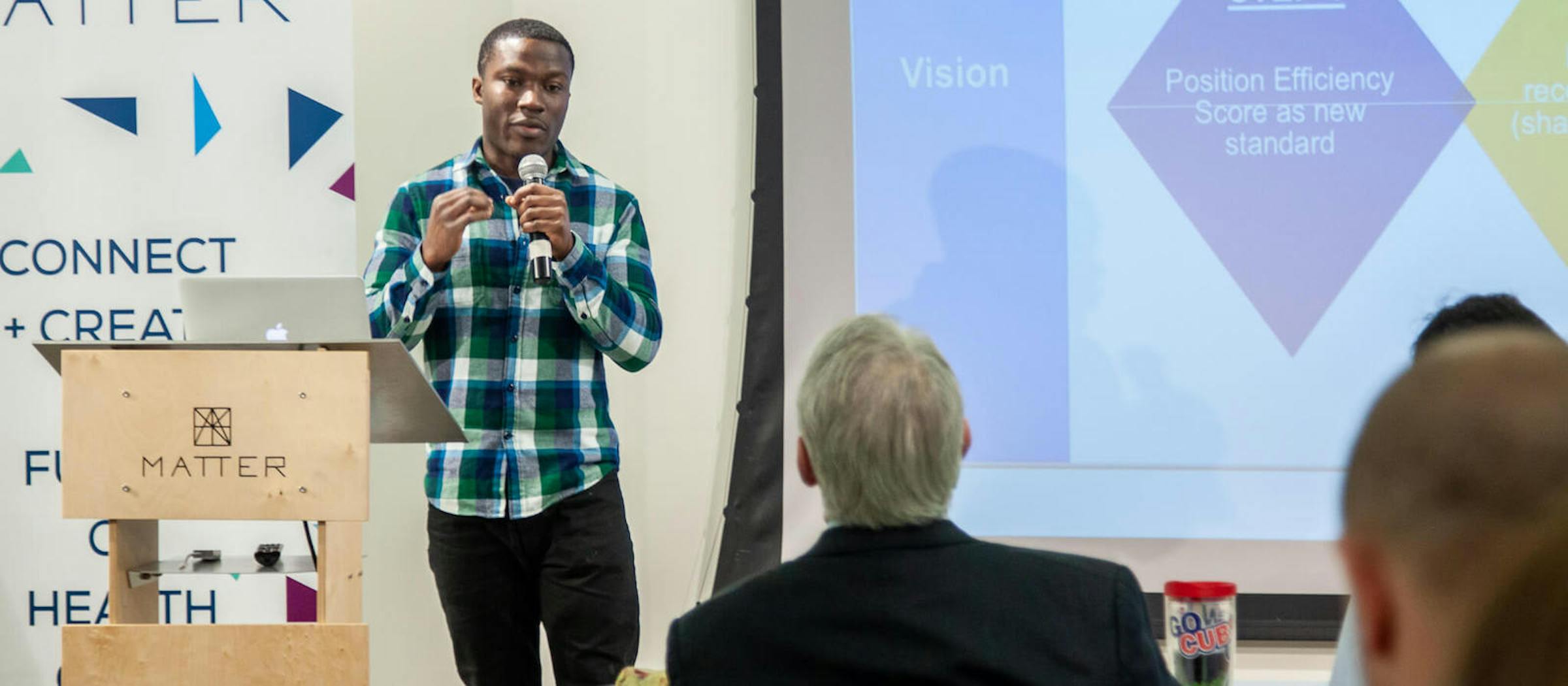Diversity in clinical trials: A conversation with MATTER member Kwaku Owusu
Most people take a medication trusting that it has been studied and approved by an official organization to be effective and safe for everyone. However, for many minority groups, that trust is not a given.
According to Kwaku Owusu, chairman of MATTER startup, Ilerasoft, and founder of Drugviu — an online platform that helps minority populations find medications that will actually work for them — there is a long way to go to fix this problem. For years, clinical trials have failed to include a meaningful percentage of minority groups, which means their findings may not be applicable to them.
We caught up with Kwaku to discuss diversity in clinical trials, possible solutions and how he created Drugviu to help.
The basics: What are clinical trials and why is diversity in them important?
“Clinical trials are used to determine the efficacy of a medication, its side effect profile and whether the side effects are tolerable. Without having a large sample size or a diverse enough group in a clinical trial, you’re not getting the true impact of how the medication would affect different groups.
“Even though we are all homo sapiens, there’s a reason why certain ethnicities are predisposed to diabetes and others are predisposed to stomach cancer. [Those differences] have to do with the genetic variations between people, and we use ethnicity as a proxy for that. So without having a large sample size of different populations, a clinical trial is not complete and we really do not know how the medication being tested would affect different minority groups. That’s why it’s important. Representation leads to better outcomes, and right now we don’t have [accurate representation].”
A two-sided problem.
“To me it’s a two-sided problem — the upstream and downstream. Upstream is actual inclusion of minority populations in clinical trials. However, at this point, even if you make the representation equal to the population, it still wouldn’t account for the 99 percent of drugs in the market that have already been approved [without accurate representation].
Even if you make the representation equal to the population, it still wouldn’t account for the 99 percent of drugs in the market that have already been approved [without accurate representation]
“For example, we now know that a lot of asthma medications do not work well for African American children, which is because [historically], African Americans haven’t been included in the clinical trials. We also know that a lot of blood thinners do not work for Pacific Islanders because their body doesn’t produce an enzyme that metabolizes that blood thinner. However, this [issue] was only discovered after those medications were approved and prescribed to those populations.”
Healthcare has known about this problem for a while.
“This is not a hidden problem. This is public health 101. [Lack of representation in clinical trials] has been a known problem for the last 25 to 30 years.
“As a matter of fact, in the early 90s, Congress stated that clinical trials must include X amount of women to be valid. Before that, there was no legal precedent for clinical trial populations. My point is that it is a known problem…There’s a lot of lip service being paid to it, but I don’t know how seriously it’s being taken. There’s really been no movement in this space for a very long time.”
The National Institute of Health (NIH) is helping, but is it enough?
“The NIH is now making it mandatory for six percent of participants of clinical trials be racially or ethnically diverse. However, 40 percent of the United States is made up of racial and ethinic minorities.”
How companies can take a stand.
“Companies themselves can institute a system with a hard policy that requires a certain amount of diversity in a clinical trial in order for the medication to be taken seriously. Contracts need to be built around that: They have to tell the CROs that, without meeting the company’s [diversity] standard, they won’t be paid. When people are not getting paid for doing trials without a diverse population, that’s when we’re going to see the change that we need to see.”
When people are not getting paid for doing trials without a diverse population, that’s when we’re going to see the change that we need to see.
The importance of building trust between the healthcare industry and minority communities.
“There’s a trust gap between minority populations — especially African Americans and Native Americans — and medicine. Historically, medicine or research has been weaponized against us. So until that trust gap is solved, healthcare organizations are going to have a hard time recruiting minorities for their clinical trials. We need to reach people where they are: Talk to them about the benefits of the clinical trial, make sure that they understand everything [the trial requires] and what we’re looking to find in the trial. Without that understanding, many minority populations won’t trust healthcare organizations enough to participate.”
Drugviu’s solution.
“Drugviu is a population health platform that helps Asian, Black, Latino and Native American people find medication that’s going to work for them. We know that, for many medications they may be prescribed, the clinical trials…did not include these populations in any meaningful number — so they don’t actually know if a drug will work for them or if the alternative is better. [At Drugviu], we take medication science and medication facts from the FDA, NIH and CDC, and then we go out to the community of minorities taking a certain medication. They let us know how the medication makes them feel — if it works and what the side effects are. We take this real world evidence and combine it with the medication science facts to create, for the first time, a way for these communities to see how the medication will affect them as reported by people who look like them.
We take this real world evidence and combine it with the medication science facts to create, for the first time, a way for these communities to see how the medication will affect them as reported by people who look like them.
They can then use [our findings] as a starting point to talk to their physician. They can go to their doctors and say ‘I noticed that people who look like me are saying that drug X does not work and drug Y is working better.’ Physicians can then use that information to make a decision about what they prescribe to that person.”
Doctors need this solution.
“There’s an excitement in the medical world about something like Drugviu because the doctors know about this issue. They know that certain drugs perform better for certain groups. They just need data to back that up. When Drugviu provides that to them, they’re able to better serve their patients. Every doctor wants to make sure their patients are getting the best medication without having to come back later, and without experiencing horrible side effects.”
An extension of a deeper problem.
“I don’t think people that are outside public health or outside the healthcare space know about this. In my experience, once you explain it to people it’s usually one of two reactions. Some are shocked and think that it’s messed up and needs to be fixed. But there’s another reaction that’s common: Many people of color aren’t surprised. People who look like them aren’t included in a lot of things, so why wouldn’t the same be true of medications and clinical trials?”
People should be able to trust medicine.
“There needs to be a lot more awareness of this [problem] in the general public because there’s nothing more important than your health. When you’re sick you take medication to get better, but what if that medication wasn’t made for people who look like you or there’s a better alternative? You shouldn’t have to suffer unnecessarily before you realize that. We need to bring more awareness about…the lack of diversity in clinical trials. We can help end a lot of unnecessary suffering if we do.”



